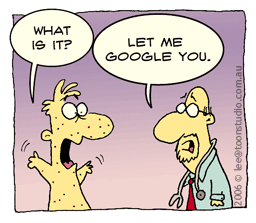How many times, if ever, have you googled a patient? – Epilogue
In September of 2012 I asked “How many times, if ever, have you googled a patient?” I wrote “As a physician/pathologist there are a number of forms of data available to you, specimen requisition information, clinical history, electronic medical records, laboratory tests, radiology studies, operative notes, etc…”
I n some cases, the information may not be available (brunt of work-up, radiology, pre-operative visit, etc…) performed outside your institution where these impressions and results may normally be available to you. I shared a personal experience I had with this and mentioned an older cardiologist friend who taught me years ago “Keith, there are two keys to practicing medicine; 1. Do everything the same way, everytime. This lowers the likelihood you will miss something. Whether it is a taking a clinical history, physical exam, reading an EKG, reading a chest x-ray (from outside in, or inside out, top-down, down-up), however you choose to do it, do it the same way everytime. And 2. Cheat. Cheat all the time. Meaning get as much information as you possibly can. MD stands for medical detective. Get information from as many sources as possible.”
n some cases, the information may not be available (brunt of work-up, radiology, pre-operative visit, etc…) performed outside your institution where these impressions and results may normally be available to you. I shared a personal experience I had with this and mentioned an older cardiologist friend who taught me years ago “Keith, there are two keys to practicing medicine; 1. Do everything the same way, everytime. This lowers the likelihood you will miss something. Whether it is a taking a clinical history, physical exam, reading an EKG, reading a chest x-ray (from outside in, or inside out, top-down, down-up), however you choose to do it, do it the same way everytime. And 2. Cheat. Cheat all the time. Meaning get as much information as you possibly can. MD stands for medical detective. Get information from as many sources as possible.”
 Early last month there was an article in the New York Times entitled “When Doctors ‘Google’ Their Patients“, written by Dr. Haider Javed Warraich, an accomplished internal medicine resident and Katherine Swan Ginsburg Fellow in Humanism at the Beth Israel Deaconess Medical Center in Boston as well as an author (see: Auras of the Jinn).
Early last month there was an article in the New York Times entitled “When Doctors ‘Google’ Their Patients“, written by Dr. Haider Javed Warraich, an accomplished internal medicine resident and Katherine Swan Ginsburg Fellow in Humanism at the Beth Israel Deaconess Medical Center in Boston as well as an author (see: Auras of the Jinn).
































